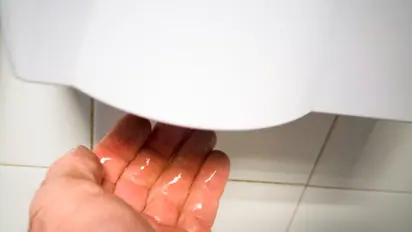SHOCKING! Scientist's viral experiment reveals why you should NEVER use hand dryer in public toilets (WATCH)

Synopsis
A viral experiment by a scientist, known as Devon Science on TikTok, has revealed the alarming truth about hand-dryers in public restrooms: they may be spreading harmful bacteria directly onto your freshly washed hands.
A viral experiment by a scientist, known as Devon Science on TikTok, has revealed the alarming truth about hand-dryers in public restrooms: they may be spreading harmful bacteria directly onto your freshly washed hands.
The experiment, which has garnered over 4.7 million views, involves placing a petri dish underneath a hand-dryer to collect bacteria that is expelled by the machine. The results were shocking. After leaving the dish overnight, the scientist observed a variety of bacteria and fungus growth, including white, yellow, and black smudges, indicating contamination. In contrast, a petri dish left open in the air to mimic the drying effect of hand-shaking remained completely clear.
Devon Science also tested the bacteria levels on a piece of toilet paper, which had been used to dry hands. Though bacteria were present, the levels were significantly lower compared to those collected from the hand dryer.
To further illustrate the dirty reality of these machines, the scientist swabbed the inside of a hand-dryer’s vent, revealing so much grime that the cotton bud turned black. This led Devon Science to a grim conclusion: the bacteria aren't just in the air — they're thriving inside the machines themselves.
"Now I know where the bacteria are coming from, they are actually living inside the machine," she said in the video.
While the specific bacteria captured were not identified, previous research has pointed to dangerous pathogens like E. coli, hepatitis, and fecal bacteria lurking in public restrooms. A 2018 study from the University of Connecticut and Quinnipiac University found that hand dryers could suck in bacteria from the air and then blast it onto people's hands. The study identified up to 254 bacterial colonies after just 30 seconds of exposure to the air from a bathroom hand dryer.
The research team also tested the effect of high-efficiency particulate air (HEPA) filters attached to the dryers. The results were telling: bacteria in the dishes fell by 75% when the filters were used, confirming that the air circulating in public restrooms is often filled with harmful microorganisms.
The findings suggest that using paper towels or shaking hands dry may be a better option for avoiding bacterial exposure. Experts recommend opting for paper towels when possible, especially in public restrooms, to minimize the risk of contamination.
Explore the latest Lifestyle News covering fashion, wellness, travel, Food and Recipes, and more. Stay updated with trending Health News, fitness tips, and expert insights to inspire your daily living. Discover personalized lifestyle trends that keep you stylish and informed. Download the Asianet News Official App from the Android Play Store and iPhone App Store for everything that adds value to your everyday life.